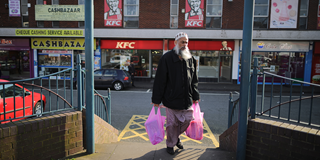The reaction against globalization has taken two forms: economic resistance to rising inequality and a revolt against multiculturalism and cosmopolitanism. To save globalization – which has lifted hundreds of millions out of poverty, created new markets for goods made by poor countries, and reduced prices for rich-country consumers – both must be addressed.
NEW DELHI – When I left India for graduate school in the United States in 1975, the word “globalization” was not in use anywhere in the world. Back then, crossing borders was still a big deal, and getting a US visa was no easy feat. When I did arrive in America, to be an Indian still carried a whiff of the exotic and the unfamiliar.
Nowadays, globalization is inescapable. Over the course of less than three decades, trade barriers came down, and the combination of accessible airplane travel, satellite television, and the Internet has created a kind of interconnected “global village.” But two types of backlash are now casting doubt on globalization’s future.
The 2008 economic crisis seems to have been the turning point in public perception. In the years leading up to the crisis, millions of people rose out of poverty, and democracy became more widespread than ever, creating the general sense that a golden age had begun. Francis Fukuyama famously argued that in the grand global struggle over the future of human political and economic organization, the forces of democracy and liberal capitalism had won a definitive victory.

NEW DELHI – When I left India for graduate school in the United States in 1975, the word “globalization” was not in use anywhere in the world. Back then, crossing borders was still a big deal, and getting a US visa was no easy feat. When I did arrive in America, to be an Indian still carried a whiff of the exotic and the unfamiliar.
Nowadays, globalization is inescapable. Over the course of less than three decades, trade barriers came down, and the combination of accessible airplane travel, satellite television, and the Internet has created a kind of interconnected “global village.” But two types of backlash are now casting doubt on globalization’s future.
The 2008 economic crisis seems to have been the turning point in public perception. In the years leading up to the crisis, millions of people rose out of poverty, and democracy became more widespread than ever, creating the general sense that a golden age had begun. Francis Fukuyama famously argued that in the grand global struggle over the future of human political and economic organization, the forces of democracy and liberal capitalism had won a definitive victory.